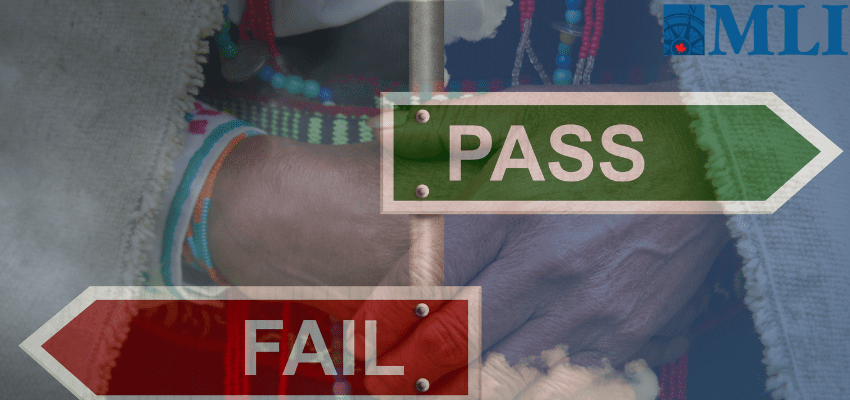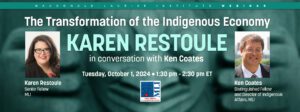By Ken Coates and Karen Restoule, September 30th, 2024
Canadians love scorecards. They look for signs that the country is moving in the right direction and that government policies are having the desired effect. We see this in the regular reporting of unemployment rates, cost of living reports, interest rates, housing price indices, new home starts, immigration, and a hundred other statistical reports.
So, it is with Indigenous affairs in Canada. The country eagerly looks for signs that federal expenditures of large sums, Indigenous court victories, and substantial re-empowerment of Indigenous governments are making things better. This is precisely the wrong way to judge reconciliation.
If Canadians are waiting for a statistical report that tells us, once and for all, that reconciliation with First Nations, Inuit, and Metis peoples is complete, they will wait in vain. For the past ten years, a single metric – the grand promise of 2015 that Canada would provide clean and safe water to Indigenous communities – was the symbolic stand-in for Ottawa’s efforts to offset generations of bad and ineffective government policies. Canada did poorly, as the Parliamentary Budget Office has confirmed, in the provision of the most basic of community services and has failed miserably at almost every important metric.
The national response has been to double down on, or even expand, policies that did not work in the past. Unfortunately, paternalism is one of the most powerful forces in Canadian government: it formulates plans, develops program criteria, uses Ottawa-centric decision-making processes, and creates intrusive and time-consuming reporting and accounting requirements that overwhelm Indigenous community officials.
A history of broken promises
Starting before Confederation, Indigenous people protested government intrusions, sought the ability to make their own decisions, and struggled to get the resources needed to maintain a decent standard of living.
Penury, not generosity, defined federal approaches to Indigenous peoples: their quality of life deteriorated sharply when they lost access to their lands and harvesting opportunities, and declined even more rapidly once social welfare programs and expanded and welfare dependency became the norm. Policies and administrative initiatives explicitly designed to improve Indigenous lives had precisely the opposite effect.
As the 20th century progressed, Ottawa’s presence in, and impact on, Indigenous lives expanded exponentially. Consider that, in the 1950s, most Indigenous peoples in Canada continued to hunt, trap and fish, and language use and cultural practices remained strong in some parts of the country. By the 1980s, thanks to forced relocation to government-run reserves, residential and day school education, and severe marginalization by the dominant society, Indigenous language use had nearly vanished, particularly among the young. Migration to larger centres accelerated, and welfare dependency skyrocketed. Federal monetary transfers dominated Indigenous economies. The Government of Canada became the most powerful force in the lives of most Indigenous peoples.
Yet, they fought back. They argued for government and public recognition of Indigenous and treaty rights. When that failed, they sought recourse through the courts.
After decades of struggle, the tide began to turn. Indigenous peoples won hundreds of court cases. They negotiated new treaties and, eventually, self-government agreements. They worked to educate a reluctant and uninformed Canadian public about Indigenous history, needs, and aspirations. First Nations, Metis, and Inuit leaders secured a place in the patriated Canadian constitution, negotiated multi-billion-dollar compensation settlements, started economic development corporations, negotiated collaboration agreements with resource companies (while protesting projects that intruded on their communities), and restructured their governments (often by revitalizing age-old customary governments).
That Indigenous leaders did all of this while coping with community struggles such as intense poverty, suicide, cultural loss, housing shortages, members’ substance abuse and domestic challenges, government neglect, and the depletion of harvesting opportunities makes the political transformation truly remarkable.
Many challenges remain
It would be a time to celebrate – if only there wasn’t so much more work to do. The question is: will the rest of Canada walk in partnership with Indigenous peoples – or remain a stumbling block?
The answer is complicated, and somewhat troubling. Some politicians have figured out the basics, primarily that the law and constitution support Indigenous aspirations much more than do contemporary policies. And some jurisdictions – the three northern territories, British Columbia, Quebec, and Newfoundland and Labrador in particular – have taken substantial strides forward. Others, with Saskatchewan and New Brunswick standing out in this regard, have trouble moving beyond the bare minimum.
All governments worry about Indigenous constitutional and legal authority and, more recently, about the significance of the Government of Canada’s commitment to implement the United Nations Declaration on the Rights of Indigenous Peoples (UNDRIP), which seeks to broaden government obligations to work with Indigenous peoples and to adjust to First Nations, Metis and Inuit aspirations. With few exceptions, BC being the best example, governments have moved cautiously and episodically, avoiding real commitments to meaningful partnerships, careful not to get too far in front of limited public support for widespread engagement with Indigenous peoples.
We must also recognize that Canada doesn’t exist in a vacuum. Other countries are also grappling with the need to reconcile with Indigenous peoples. The one global truism in Indigenous affairs is that Indigenous peoples have been systematically marginalized and discriminated against. This happened in Russia and Japan, Norway and the United States, New Zealand and Taiwan.
Several things are clear. Canada has what are probably the highest annual expenditures on Indigenous affairs in the world. It also has one of the strongest constitutional and legal recognition and protection for Indigenous rights in the world. Canada has firm legal requirements to consult with Indigenous peoples before developing land and resources. The policies and programs targeted at Indigenous governments are among the most expansive and fiscally generous in the world. The national commitment to reconciliation is truly impressive – on paper.
However, Indigenous outcomes in Canada are nowhere near as impressive. Indigenous suicide rates are among the highest in the world. Unemployment among Indigenous peoples is staggeringly high, as are welfare dependency and poverty. Educational achievements are low. Indigenous language use is in freefall. Infrastructure and government services in remote communities are the worst in the country and, in the most troubling cases, closer to developing world standards than Canadian norms. In short, legal recognition and government spending alone do not quickly produce desired social, economic, and cultural outcomes. Indeed, the focus on spending has been so strong that little attention has been paid to alternate solutions. Experience in Canada suggests that two elements – political autonomy through self-government agreements and economic autonomy through the development of own source revenues and a much lower reliance on the government of Canada—are much more effective that government transfer payments.
How are other nations doing? Australia lags Canada in the recognition of Indigenous legal and constitutional rights. A national referendum designed to give Aboriginal people a permanent say in Parliament suffered an embarrassing and divisive defeat. Rural Indigenous peoples experience extreme poverty and remain disconnected from the wage economy and national prosperity. There have been promising developments in relations with resource companies and the national and state governments are more responsive and more concerned than in decades past. But socially and economically, many communities are in difficult straights.
In Scandinavia, Finland, Norway, and Sweden have different approaches. All three have well-developed social welfare systems. Education, health care, government services and basic incomes are all supported by national governments. The Sámi have representative parliaments in all three countries, although they each have little practical power. Indigenous rights are given limited attention, resulting in considerable political and legal protests, most of which produce results very slowly. But the Sámi language is stronger than most Canadian Indigenous languages and cultural practices remain commonplace. In terms of life expectancy, well-being, education and employment, the Sámi results are positioned much more strongly than all but a handful of Indigenous communities in Canada.
While the poor treatment of Indigenous peoples has been quite uniform around the world, resulting in marginalization and dispossession, there is no fixed policy or legal response to their needs and aspirations. Indigenous peoples in Canada are the envy of much of the world in legal rights, government funding, and formal commitments to reconciliation. But the Sámi, the Māori of New Zealand, and the Indigenous peoples of Taiwan are doing markedly better in most measures of social and economic well-being. Canadians are, as a nation, much better than other countries in expressing guilt and shame, particularly over things like residential schools and forced sterilization, but they remain well behind Scandinavia and New Zealand in carving out practical and meaningful space for Indigenous peoples in their midst.
Working together in a good way
Reconciliation, to put it simply, is exceptionally difficult. These are, in each instance, deeply embedded, multi-generational conflicts in which one side (Indigenous peoples) lives daily with the consequences of decades or neglect, harassment, racism, and dispassion and the other (the dominant society) has only lately had an epiphany about the damage caused by its actions, policies, and historical dominance. But newcomer apologies, offers of short-term compensation, and a preference for “looking to the future and not to the past” simply will not work.
Reconciliation is obviously a process – long-term, difficult, and painful for all – and far from a single act, declaration, or policy initiative. It requires – and New Zealand is the only country to make major strides in this direction – a realization that power must be shared, that political structures must reflect the new approaches, and that society must in all key elements (education, historical remembrance, ceremonies, and government policies) reflect the original and historical cultural foundations of the nation.
Canadians must commit to a multi-generation effort to reconstruct and reimagine the country. The new Canada must include autonomy for First Nations, Metis, and Inuit, much greater Indigenous involvement in the economy, and sincere and meaningful consultation with Indigenous peoples on major policy initiatives. When Canadians embrace these approaches, and when Indigenous people see themselves and their priorities reflected in the nation’s policies and strategies, a new relationship will be weaved into the fabric of the country.
There will be, in sum, no scorecard for reconciliation, and very likely, no giant leap forward. Progress will be incremental, and yes, Indigenous peoples will often need to push forward on their own as the rest of Canada reluctantly catches up. However, it’s time to go beyond simply platitudes. Land acknowledgements are symbolic, but they build no homes and create no prosperity for Indigenous peoples. They don’t solve language loss, improve services, or rebuild and strengthen cultures.
We need concrete measures: commitments to procure a small percentage of goods and services from Indigenous suppliers help, as do hiring quotas and commitments. But they must go along with a society-wide commitment to Indigenous autonomy and revitalization.
Canadians need to be more aware of the foundational principles of Indigenous-newcomer relations in Canada. Indigenous people hold inherent rights on these lands, each with their own history and connection to the land, and each with their own roles and responsibilities as set out by the original treaties (think, Treaty of Niagara), and respect for one another in these. There must be a willingness for Canadians, whether their family lineage dates back 400 years or 4 months, to commit to learning and understanding the realities of our shared history. Only then will the nation shift from the well-intentioned but ill-defined pursuit of reconciliation to a society based on shared prosperity, mutual respect, and a hearty appreciation for the resilience and determination of Indigenous people.
Ken Coates is a distinguished fellow and director of Indigenous Affairs at the Macdonald-Laurier Institute and professor emeritus, Johnson Shoyama Graduate School of Public Policy, University of Saskatchewan.
Karen Restoule is a senior fellow in Indigenous Affairs at MLI and vice-president of strategy at Crestview Associates. She is Ojibwe from Dokis First Nation.







